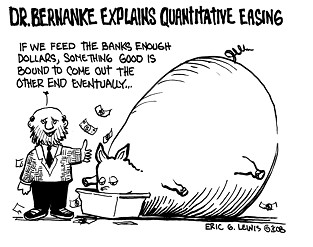The U.S. is coming to Europe’s financial rescue.
So far, America’s role is fairly limited. But if the crisis continues to grow and the U.S. takes on a wider role, U.S. consumers and taxpayers could feel a bigger impact. The biggest exposure could come from America’s status as the single largest source of money for the International Monetary Fund.

The latest round of American financial assistance came Thursday with a promise by the Federal Reserve to swap as many dollars for euros as European bankers need. In the short run, those transactions won’t have much impact because the central banks are simply swapping currencies of equal value. If the move helps avert a wider crisis, it could help spare the global economy from another recession. But over the long term, consumers could feel the impact of central bankers flooding the financial system with cash, according to John Ryding, chief economist at RDQ Economics.“This is a lender of last resort function,” he told CNBC. “With the dollar injections that the Fed has done, it’s like giving a patient medicine with really bad side effects.” Ryding said the bad side effect in the U.S. has been inflation, which has picked up to 3.8 percent year over year. Fed policymakers meet next week to decide whether the flagging U.S. economy needs another round of easy-money measures that could include buying more Treasury bonds to push more cash into the financial system. Read on at MSNBC
So far, America’s role is fairly limited. But if the crisis continues to grow and the U.S. takes on a wider role, U.S. consumers and taxpayers could feel a bigger impact. The biggest exposure could come from America’s status as the single largest source of money for the International Monetary Fund.

The latest round of American financial assistance came Thursday with a promise by the Federal Reserve to swap as many dollars for euros as European bankers need. In the short run, those transactions won’t have much impact because the central banks are simply swapping currencies of equal value. If the move helps avert a wider crisis, it could help spare the global economy from another recession. But over the long term, consumers could feel the impact of central bankers flooding the financial system with cash, according to John Ryding, chief economist at RDQ Economics.“This is a lender of last resort function,” he told CNBC. “With the dollar injections that the Fed has done, it’s like giving a patient medicine with really bad side effects.” Ryding said the bad side effect in the U.S. has been inflation, which has picked up to 3.8 percent year over year. Fed policymakers meet next week to decide whether the flagging U.S. economy needs another round of easy-money measures that could include buying more Treasury bonds to push more cash into the financial system. Read on at MSNBC